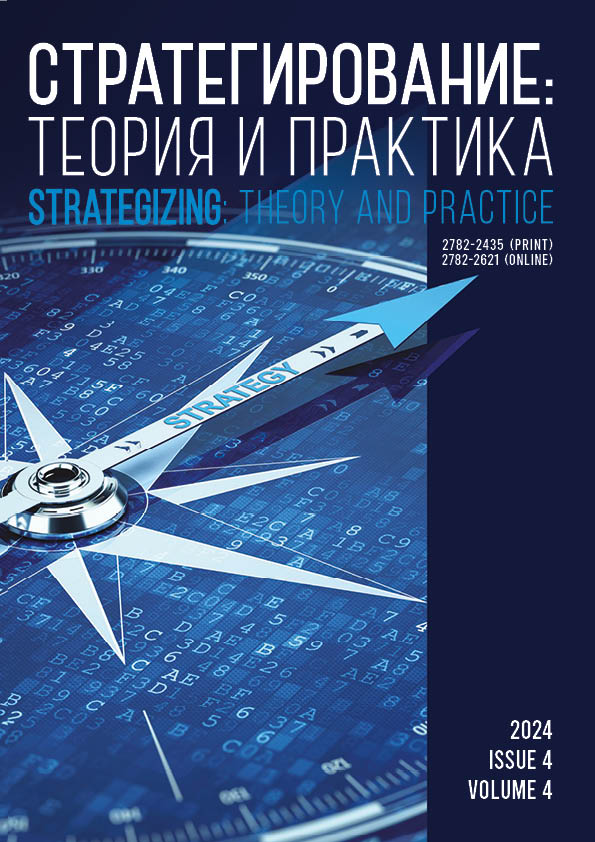from 01.01.2024 until now
Moscow, Moscow, Russian Federation
UDC 30
The growing importance of knowledge as a production factor in the early XX century led to the development of knowledge-intensive economy. Further research yielded the concepts of knowledge capital and knowledge potential. The current shift to knowledge-intensive economy also affects traditional industries, where knowledge is becoming a key competitive factor. The present research relied on the theory of strategy and the methodology of strategizing developed by Professor V.L. Kvint. The paper describes the main stages and elements of strategizing the knowledge potential. The author reviewed the concepts of human capital, knowledge capital, and knowledge potential defined by J. Schumpeter, F. Hayek, E. Phelps, O. Williamson, J.K. Galbraith, S. Kuznets, T. Schultz, G. Becker, T. Stewart, and V.L. Makarov to trace the existing approaches to the economic role of knowledge as a key economic resource. A number of case studies made it possible to visualize the concepts of knowledge potential, knowledge capital, and knowledge strategizing. The resulting stages of knowledge potential strategy covered the main trends, strategic interests, and opportunities. The strategizing of knowledge potential demonstrated a number of peculiarities, e.g., the explicit social nature of strategic interests. An efficient strategy for knowledge potential development should reflect the interests of all stakeholders because some of these interests may cancel each other.
knowledge potential, human capital, strategizing, public value, knowledge economy
1. Aganbegyan AG. On Priority Development of Knowledge Economy. Economic Revival of Russia. 2021;(1):15–22. (In Russ.) https://doi.org/10.37930/1990-9780-2021-1-67-15-22
2. Aganbegyan AG. Prospects for Innovative Development of Russia (Part I). Russian competition law and economy. 2023;(1):8–21. (In Russ.) https://doi.org/10.47361/2542-0259-2023-1-33-8-21
3. Akaev AA. Long Waves of Conjuncture and Schumpeter-Kondratyev Innovation-Cyclical Theory of Economic Development. Economics of Contemporary Russia. 2013;(2):7–29. (In Russ.) https://www.elibrary.ru/QCNFPX
4. Akaev AA, Sadovnichii VA. The Human Component as a Determining Factor of Labor Productivity in The Digital Economy. Problemy Prognozirovaniya. 2021;(1):45–48. (In Russ.) https://doi.org/10.47711/0868-6351-184-45-58
5. Becker GS. The economic approach to human behavior. Moscow: HSE Publ; 2003. 672 p. (In Russ.)
6. Valras L. Elements of Pure Political Economy. Moscow: Izograf; 2000. 448 p. (In Russ.)
7. Galbraith JK. The Affluent Society. Moscow: Olimp-Biznes; 2018. 404 p. (In Russ.)
8. Kvint VL. The Concept of Strategizing. SPb.: NWM RANEPA; 2020. 164 p. (In Russ.) https://www.elibrary.ru/CDMBHK
9. Kvint VL. The Concept of Strategizing. Kemerovo: Kemerovo State University; 2022. 170 p. (In Russ.) https://doi.org/10.21603/978-5-8353-2562-7
10. Kvint VL, Bodrunov SD. Strategic transformation of society: knowledge, technology, and noonomy. St. Petersburg: INIR im. S.Yu. Vitte; 2021. 351 p. (In Russ.) https://www.elibrary.ru/FKSHWL
11. Kvint VL, Khvorostyanaya AS, Sasaev NI. Advanced technologies in strategizing. Economics and Management. 2020;26(11):1170–1179. (In Russ.) htps://doi.org/10.35854/1998-1627-2020-11-1170-1179
12. Kuzminov Y, Sorokin P, Froumin I. Generic and Specific Skills as Components of Human Capital: New Challenges for Education Theory and Practice. Foresight and STI Governance. 2019;13(S2):19–41. https://doi.org/10.17323/2500-2597.2019.2.19.41
13. Novikova IV. Strategizing of the Human Resources Development: Main Elements and Stages. Strategizing: Theory and Practice. 2021;1(1):57–65. (In Russ.) https://doi.org/10.21603/2782-2435-2021-1-1-57-65
14. Petty V, Smith A, Ricardo D. Anthology of economic classics. Moscow: Ekonov; 1993. 476 p. (In Russ.)
15. Smirnov VT, Skoblyakova IV. Classification and typology of human capital in an innovative economy. Management of Social and Economic Systems. 2006;(1):1. https://www.elibrary.ru/HVGWUD
16. Smit A. Inquiry into the nature and causes of the wealth of nations. Moscow: Eksmo. 960 p. (In Russ.)
17. Styuart TA. Knowledge Capital: A new source of wealth for companies. Moscow: Pokolenie; 2007. 368 p. (In Russ.)
18. Williamson OE. The economic institutions of capitalism: Firms, markets, relational contracting. St. Petersburg: Lenizdat; 1996. 702 p.
19. Hayek FA. Individualism and economic order. Chelyabinsk: Society; 2011. 394 c. (In Russ.)
20. Schumpeter JA. History of economic analysis. St. Petersburg: Economic school; 2004. 496 c. (In Russ.)
21. Schumpeter JA. Capitalism, socialism, and democracy. Moscow: Economy; 1995. 540 p. (In Russ.)
22. Kolesov VP, Makarov VL, Ilin MS, Grinberg RS, Eliseev AN, Shulga IE, et al. Knowledge economy: Collective Monograph. Moscow: INFRA-M; 2008. 432 p. (In Russ.)
23. Becker GS. Investment in Human Capital: A. Theoretical Analysis. Journal of Political Economy. 1962;70(5). Part 2. https://doi.org/10.1086/258724
24. Egbu CO. Managing Knowledge and Intellectual Capital for Improved Organizational Innovations in the Construction Industry: An Examination of Critical Success Factors. Engineering, Construction and Architectural Management. 2004;11(5):301–315. https://doi.org/10.1108/09699980410558494
25. Kuznets S. Schumpeter's Business Cycles. The American Economic Review. 1940;30(2):257–271.
26. Phelps E. Mass Flourishing: How Grassroots Innovation Created Jobs, Challenge, and Change. Princeton University Press; 2013. 378 p.
27. Schulz TW. Investment in Human Capital. American Economic Review. 1961;51(1):1–17.
28. Schumpeter JA. Business Cycles. A Theoretical, Historical and Statistical Analysis of the Capitalist Process. New York: McGraw-Hill Book Company; 1939. 461p.
29. Valente AC, Salavisa I, Lagoa S. Work-based cognitive skills and economic performance in Europe. European Journal of Innovation Management. 2016;19(3):383–405. https://doi.org/10.1108/EJIM-07-2014-0073






